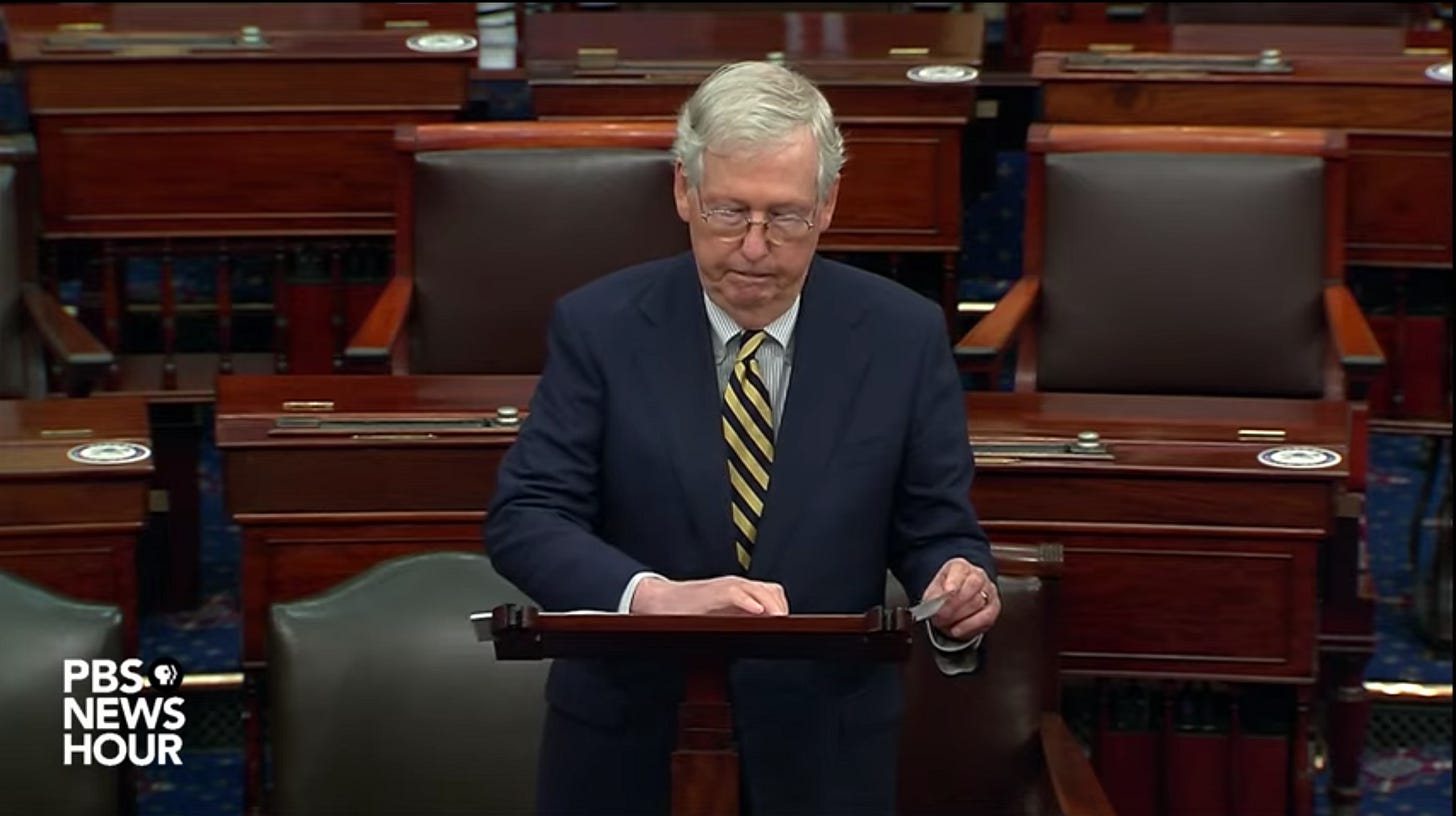The GOP Could Have Everything It Ever Wanted
And it won't let the re-election of a couple of senators, or even Trump, get in the way.

Screenshot: PBS Newshour
For anyone who thought the Democrats would be able to build the coalition in the Senate to stop Donald Trump from filling Ruth Bader Ginsburg’s seat with a 30-year-old tradcath on the backs of vulnerable swing-state Republican senators, North Carolina Sen. Thom Tillis did a great job dispelling that notion almost immediately over the weekend.
Tillis’s seat is a requirement for the Democrats to flip the Senate, and as of right now, it’s not looking great for him. Cal Cunningham, a former state senator handpicked by the DSCC, is running ahead of Joe Biden in North Carolina and Tillis hasn’t polled ahead of Cunningham since June.
But Tillis, while he may not be as devoted an ideologue as someone like Josh Hawley or Tom Cotton, does understand power in a very real way, which he has proven time and time again dating back to his days as the Speaker of the North Carolina House of Representatives. And he, like his colleagues, knows that the chance to solidify a reactionary majority on the Supreme Court for the next decade at least, and 30 or 40 years at most, is worth whatever happens to the GOP in the fall.
It’s even more worth it for Mitch McConnell, which makes comments like this one from former U.S. Sen. Claire McCaskill so bewildering:

What, exactly, about the last four years indicates that Mitch McConnell values anything over the judiciary? For McConnell, the judiciary is power.
Practically the only thing the Senate has done well during Trump’s nearly four years in office, aside from the tax cuts, has been confirming judges. Trump has appointed, and the Senate has confirmed, 216 Article III federal judges since January 2017, a full quarter of all active federal judgeships in the United States. In eight full years, during six of which the Democrats controlled the U.S. Senate, Barack Obama appointed 329 of those judges. Trump, if re-elected, is on track to top that number by more than a hundred.
For McConnell and the Senate GOP, filling Ruth Bader Ginsburg’s seat and locking in a right-wing majority is just the job—more than getting elected, and certainly more than making sure our democratic institutions remain intact. The Republicans have spent the last ten years trying to figure out a way to smoothly get rid of Obamacare, and several decades trying to figure out how to gut every other public service available to poor and working-class Americans, including Medicare and Social Security.
In the short-term, Chuck Schumer might become majority leader. In the long-term, no reform or law or program worth its weight in salt will ever hold up in court. That’s a trade McConnell, Tillis, and most of the rest of the Senate GOP caucus is willing to take. Mitt Romney, Chuck Grassley, and Cory Gardner—three of the names most prominently mentioned as potential swing votes—all announced this week that they would support a vote before the end of this year, with Gardner, who will probably lose his re-election, flat-out saying he’ll support whoever Trump nominates.
Whatever Mitt Romney thinks of Donald Trump was always going to be irrelevant. Part of what drove the formation of the modern conservative project and coalition itself was the desire to undo the changes in American society wrought by the court in the post-war era, most notably in Brown vs. Board of Education and Roe v. Wade.
Roe and Brown have been so slowly and so methodically worn down over the past several decades as to become functionally nonexistent in many places, but in Roe’s case particularly, this 19-year blip in time where the Supreme Court wasn’t fully dedicated to business interests and social conservatism has been driving Republicans to the polls for decades. This is the chance to do it; not doing it would have the effect of splitting the GOP coalition in such a way that would cease to exist.
The Democrats are at a similar turning point, though they don’t seem to be displaying the same sense of urgency. Schumer said on Sunday that all options were on the table, including admitting D.C. and Puerto Rico as states and expanding the court, while Nancy Pelosi insisted the House has “arrows in our quivers” to gum up the Senate calendar. But Pelosi is refusing to leverage a government shutdown to achieve those ends, and Joe Biden’s campaign is reportedly signaling its displeasure with calls to expand the court. Meanwhile, Schumer and the Senate Democrats reportedly have “no immediate appetite” to use the tools at their disposal to grind Senate business to a halt, and Dianne Feinstein, the top senator on the Judiciary Committee, is actively trying to shut any reform movement down. It seems pretty obvious where this is all headed.
More than anything, what the Democrats should take from this is that the Republicans are showing them what it looks like to have an agenda and the political willpower and support of your base to achieve your goals. That is what politics is. And if you have the support you need, all of the mountains of theoretical obstacles to that agenda—including our democratic traditions, public opinion, stability, legislative procedure, the Constitution, and every other American institution that was supposed to stop a slide into authoritarianism—become mere molehills that Mitt Romney will have no problem stepping over on his way to the big party the Federalist Society is going to throw once this shit is over and done with.







I only we had a true opposition party but the DNC gave up on playing that role over thirty years ago.
Great piece. Can't, wouldn't argue with anything.
seeing the words "in the short term, Chuck Schumer might be majority leader" made me throw up in my mouth a bit.